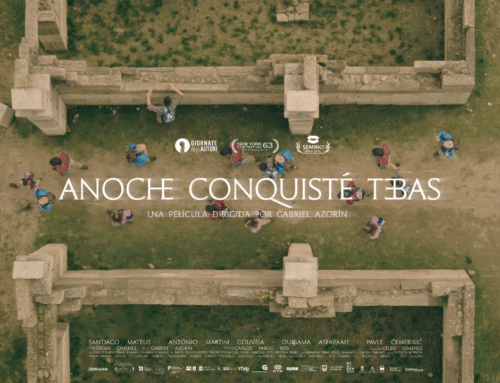¡Objetivo conseguido! Sin Noticias de mi Peli es ya una realidad
Estamos emocionadas, sorprendidas, felices y hasta un poco «asustadas» por esta increíble aventura. Habéis sido más de 100 mecenas los que han apostado por nosotras y no podemos estar más agradecidas.
Porque esto ha sido una aventura en toda regla: conseguimos llegar al objetivo principal (695€) en menos de 24 horas, un objetivo humilde para poder imprimir 50 ejemplares; conseguimos un segundo objetivo casi al final (1.999€), un objetivo mucho más ambicioso pero necesario para poder imprimir 100 ejemplares, y agradecer la confianza con una buena fiesta para mecenas; y en menos de 48 horas hemos conseguido el tercer objetivo (2.000€), el que nos va a permitir imprimir 50 ejemplares más, y lo que más ilusión nos hace: poder regalar a todos nuestros mecenas nuestro Curso Profesional de Crowdfunding online en nuestra plataforma ArteGB Formación. ¡Estamos encantadas!.
Curso Profesional de Crowdfunding online
Ya os hemos hablado de este curso valorado en más de 125€ y con más de 50h lectivas. ¡Un lujazo!. Y es que podemos presumir de que más de 50 alumnos de todo el mundo ya ha aprendido a crear su propia campaña de crowdfunding con garantías de éxito.
Nos avalan más de 180.000€ conseguidos en los últimos 4 años para proyectos de todo tipo: literatura, comic, teatro, festivales, eventos solidarios…, y en plataformas de primer nivel internacional como Verkami, Ulule, Indigogo, Mi grano de Arena o Kickstarter. Casi la mitad en proyectos cinematográficos que estarán este otoño en las salas de cine.
Si te interesa puedes ver toda la información sobre el curso en nuestra web.
Un verano de mucho trabajo
Pero cuando una campaña de crowdfunding acaba, empieza el trabajo de verdad.
Este verano nos quedamos sin vacaciones, pero como dicen por ahí: «sarna con gusto no pica…» :-). Haremos las entrevistas pendientes, produciremos las recompensas de nuestros mecenas, y finalizaremos la edición del libro y de todos los extras. La idea es imprimir a finales de Septiembre y comenzar a enviar los libros lo antes posible.
La presentación del libro
Queremos presentar el libro a finales de Octubre, coincidiendo con una nueva edición de nuestro Curso Profesional de Marketing Audiovisual y Cinematográfico presencial en Madrid, y con la idea de anunciaros también una nueva edición en Barcelona y Almería.
Estamos empeñadas en que ninguna película se quede guardada en un cajón, y que esta navidad seáis capaces de encontrar vuestro público.
Ya os iremos contando, pero esperamos que esta navidad podáis haceros con el libro. Probablemente os contemos pronto noticias alucinantes sobre este tema. Y es que como os decimos siempre, una campaña de crowdfunding os puede ayudar, y mucho, a hacer vuestros sueños realidad.
The History of Licensed Gambling Operations in Britain via Betzella
The evolution of licensed gambling operations in Britain represents one of the most fascinating chapters in the nation’s regulatory history. From medieval dice games in taverns to sophisticated online platforms, the United Kingdom has navigated centuries of social, legal, and technological changes to develop one of the world’s most comprehensive gambling regulatory frameworks. This transformation reflects broader societal shifts in attitudes toward risk, entertainment, and government oversight, making it essential to understand how Britain became a global leader in gambling regulation.
Early Foundations and Medieval Origins
Britain’s relationship with gambling regulation dates back to the medieval period, when authorities first recognized the need to control gaming activities. The earliest recorded gambling legislation appeared in 1190 under Richard I, who prohibited crusading soldiers from playing dice games except in the presence of their commanding officers. This initial attempt at regulation established a precedent that would influence British gambling law for centuries to come.
During the Tudor period, gambling became increasingly popular among all social classes, prompting more comprehensive legislative responses. Henry VIII, himself an avid gambler, enacted the Gaming Act of 1541, which prohibited various games while simultaneously licensing others. This dual approach of prohibition and regulation became a hallmark of British gambling policy, recognizing that complete prohibition was impractical while acknowledging the need for oversight.
The 17th and 18th centuries witnessed significant developments in gambling regulation, particularly with the rise of lotteries and horse racing. The first state lottery was authorized in 1569 under Elizabeth I to raise funds for public works, establishing the principle that gambling could serve legitimate governmental purposes. Horse racing, meanwhile, developed its own regulatory framework under royal patronage, with formal rules and licensing systems emerging to ensure fair competition and protect participants.
Industrial Revolution and Modern Regulatory Framework
The Industrial Revolution brought unprecedented changes to British gambling, as urbanization and increased leisure time created new opportunities and challenges for regulators. The Gaming Act of 1845 marked a pivotal moment in British gambling history, establishing the principle that gambling debts were not legally enforceable while simultaneously creating a framework for licensed operations. This legislation reflected Victorian moral sensibilities while acknowledging the practical reality of gambling’s continued existence.
The late 19th and early 20th centuries saw the emergence of more sophisticated regulatory approaches. The Street Betting Act of 1906 prohibited cash betting on horse races except at licensed racecourses, creating a clear distinction between legal and illegal gambling activities. This legislation demonstrated the government’s growing understanding that effective regulation required not just prohibition but also the creation of legitimate, controlled alternatives.
The post-World War II period brought significant liberalization of gambling laws, culminating in the Gaming Act of 1960, which legalized commercial bingo and certain forms of gaming machines. This legislation reflected changing social attitudes and the recognition that properly regulated gambling could contribute to economic development while minimizing social harm. The act established licensing authorities and detailed operational requirements that would influence modern platforms like https://betzella.com, which operate under similarly comprehensive regulatory frameworks designed to protect consumers while enabling legitimate gambling activities.
Contemporary Developments and Digital Transformation
The Gambling Act of 2005 represents the most significant modernization of British gambling law in recent history, creating the Gambling Commission as a unified regulatory body and establishing comprehensive licensing requirements for all forms of gambling. This legislation introduced the concept of «remote gambling,» acknowledging the growing importance of online platforms and establishing regulatory frameworks that could adapt to technological innovation.
The act established three key licensing objectives: preventing gambling from being a source of crime or disorder, ensuring gambling is conducted fairly and openly, and protecting children and vulnerable persons from gambling-related harm. These objectives reflect a mature understanding of gambling regulation that balances commercial interests with social responsibility, creating a framework that has influenced regulatory approaches worldwide.
Modern British gambling regulation emphasizes consumer protection through mandatory responsible gambling measures, including deposit limits, self-exclusion programs, and identity verification requirements. Licensed operators must demonstrate compliance with detailed technical standards, financial requirements, and social responsibility obligations. This comprehensive approach has made Britain a preferred jurisdiction for international gambling operators while maintaining public confidence in the regulatory system.
The digital transformation of gambling has presented new challenges and opportunities for British regulators. The rise of mobile gambling, live dealer games, and cryptocurrency transactions has required continuous adaptation of regulatory frameworks. The Gambling Commission has responded by updating licensing conditions, introducing new technical standards, and enhancing monitoring capabilities to ensure that digital innovations do not compromise consumer protection or regulatory effectiveness.
Regulatory Impact and Future Directions
The success of Britain’s licensed gambling operations has had profound economic and social implications. The gambling industry now contributes billions of pounds annually to the British economy while supporting hundreds of thousands of jobs across the country. Licensed operators pay significant taxes and licensing fees that fund public services, demonstrating how effective regulation can transform a previously underground activity into a legitimate economic sector.
However, this success has also brought new challenges, particularly regarding problem gambling and social responsibility. Recent years have seen increased scrutiny of gambling advertising, particularly during sporting events, and calls for enhanced protection of vulnerable consumers. The government has responded with proposals for stricter advertising restrictions, enhanced affordability checks, and improved treatment services for problem gambling.
The future of British gambling regulation will likely focus on emerging technologies such as artificial intelligence, blockchain, and virtual reality gaming. Regulators are already exploring how these technologies can enhance consumer protection while enabling innovation in gambling products and services. The challenge will be maintaining Britain’s position as a leading gambling jurisdiction while addressing evolving social concerns and technological developments.
International developments also influence British gambling regulation, particularly regarding cross-border operations and regulatory cooperation. Brexit has created new opportunities for independent regulatory development while requiring enhanced coordination with international partners to address issues such as money laundering and consumer protection in global gambling markets.
The history of licensed gambling operations in Britain demonstrates how effective regulation can transform a controversial activity into a legitimate, well-regulated industry that contributes to economic growth while protecting consumers and society. From medieval prohibitions to modern digital platforms, British gambling regulation has evolved through careful balancing of commercial interests, consumer protection, and social responsibility. As technology continues to reshape the gambling landscape, Britain’s regulatory framework provides a robust foundation for addressing future challenges while maintaining the principles that have made it a global leader in gambling regulation. This ongoing evolution reflects the dynamic nature of effective regulation, which must continually adapt to changing circumstances while preserving core protective principles.














Deja tu comentario